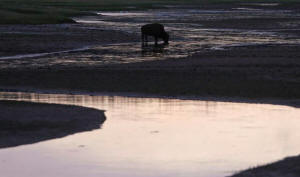|
Yellowstone River reopens after deadly
parasite killed thousands of fish
 Send a link to a friend
Send a link to a friend
 [September 24, 2016]
By Ruffin Prevost [September 24, 2016]
By Ruffin Prevost
CODY, Wyo. (Reuters) - Montana reopened a
stretch of the Yellowstone River to fishing and other recreational
activities on Friday after a month-long closure prompted by the spread
of a deadly aquatic parasite that killed thousands of whitefish and
sapped the local economy.
Hot, dry conditions and low stream flows had exacerbated the spread of
the microbial bug along the most heavily fished river system in a state
where fly fishing is a cherished pastime for residents, and a key draw
for visiting anglers who spend millions of dollars casting for trout in
pristine waters.
The 17-mile (27-km) section of river upstream from the small tourist
town of Livingston was the last to be reopened after an August 19 order
closed 183 miles (295 km) of the river from Gardiner, near the northern
boundary of Yellowstone National Park.

The closure was imposed by Montana's Fish, Wildlife and Parks agency and
backed by Governor Steve Bullock, who last month said the rare but
virulent parasite posed a threat to Montana's outdoor economy and tens
of thousands of jobs.
News of the reopening comes as ExxonMobil Corp. agreed to pay $12
million to Montana and the U.S. government to restore natural resources
damaged or destroyed by a pipeline rupture in 2011 that spilled oil into
the Yellowstone River.
The agency has found more than 2,000 dead mountain whitefish along
stretches of the Yellowstone River, with an estimated 20,000 or more
presumed killed in the outbreak. Some rainbow trout and Yellowstone
cutthroat trout have also been affected.
Recent cooler temperatures and wet weather have eased stress on the
river and its fish.
[to top of second column] |

A bison grazes after sunset in Yellowstone National Park, Wyoming,
June 7, 2013. REUTERS/Jim Urquhart/File Photo

"It has affected people profoundly, because the last couple of weeks
of August are usually a most profitable time for us," said Dandy
Reiner, owner of Hatch Finders Fly Shop in Livingston.
"I am worried about next year, whether this happens again or people
are afraid to come fishing - I don't know what's going to happen,"
she said.
Reiner said many fishing guides and others who make a living along
the river suffered a significant fall in income.
The closure cost the local economy an estimated $500,000 or more,
the Institute for Tourism and Recreation Research at the University
of Montana said this week.
Even so, some anglers saw the demise of thousands of whitefish as a
good sign for the prized trout, which they said would now have less
competition for food in the river.
(Reporting by Ruffin Prevost in CODY, Wyoming; Editing by Eric M.
Johnson and Alden Bentley)
[© 2016 Thomson Reuters. All rights
reserved.]
Copyright 2016 Reuters. All rights reserved. This material may not be published,
broadcast, rewritten or redistributed.
 |